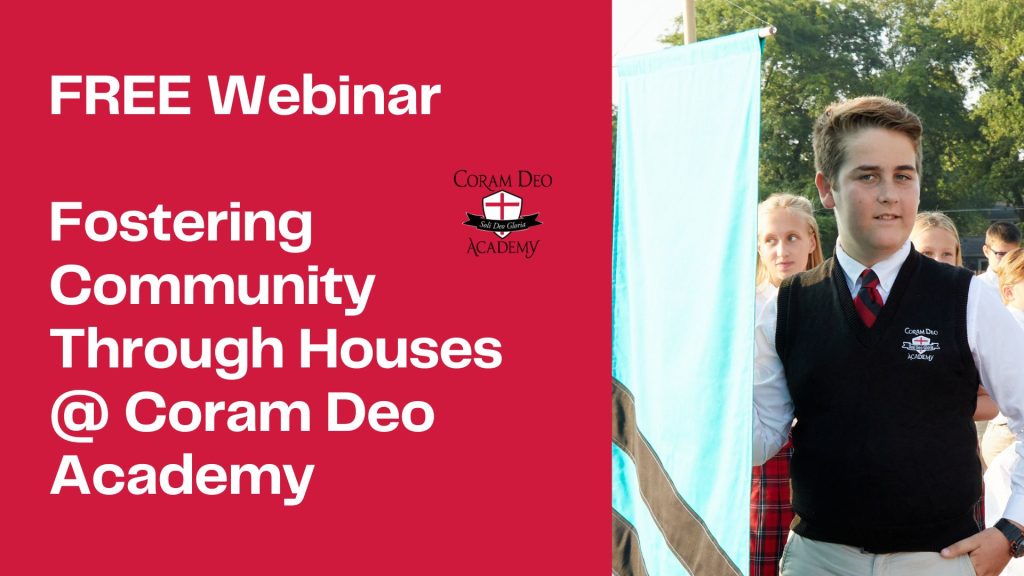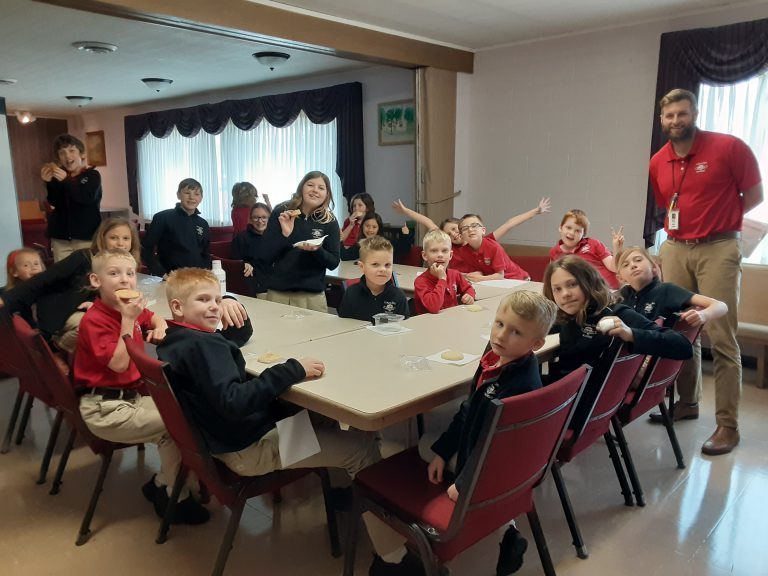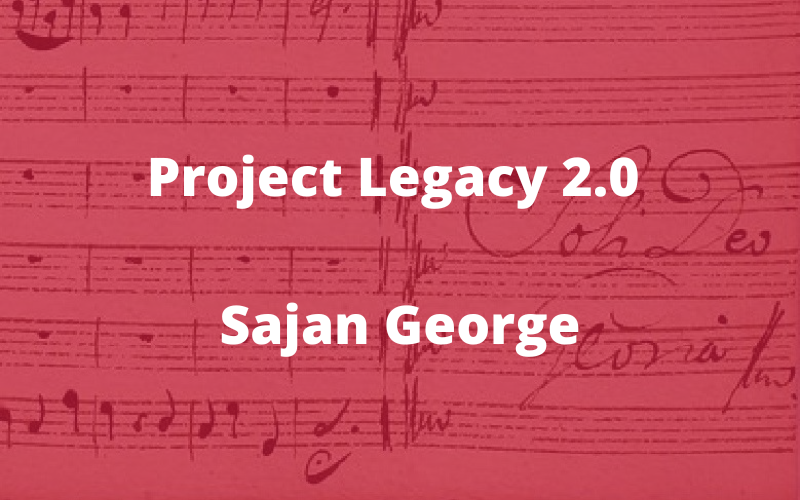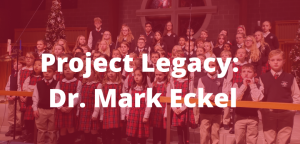By David Seibel, Head of School

I really wish I would have met Sajan George when I was in college, because he could have helped tear down the secular-sacred divide in my mind. The secular-sacred divide is the misguided notion that life is divided between a sacred realm, limited to things like worship and personal morality, and a secular realm that includes science, politics, economics, and the rest of the public arena (“The Sacred/Secular Divide and the Christian Worldview”). Right after I came to Christ at Wabash College, I knew God called me to sacred activities like reading Scripture and evangelizing, but I still had to finish out my secular activities like earning a degree in Economics and getting hired for a job in education.
Instead of seeing all of my life as before the face of God and for the glory of God, my academic interests and my athletic engagements were only distantly related to my new-found spiritual life in Christ. Sajan George, an evangelical entrepreneur, is someone who has helped me to see that whatever you’re doing, whoever you’re with, and wherever you’re at, you can do it in a Christ-centered redemptive fashion.

Sajan George is a managing partner at Praxis which is an organization that brings together Founders, Funders and Innovators who are motivated by their faith to love their neighbors and renew culture. If you have never heard of the work of Praxis, this quote from Sajan provides a gateway into the world of redemptive entrepreneurship:
We (as believers) need to build things that point to a different king and a different kingdom.
For Sajan, this is not just a nice-sounding cliche but describes the work he has sought to do in education, real estate development, and business. He founded Matchbook Learning in 2011, a school turnaround organization, which recovers dreams and hopes of both parents and children in the unseen bottom 5% of the population. (See his TedTalk). Here are my top lessons after sitting down with Sajan George.
Lesson #1: Take the First Step in Closing the Secular-Sacred Divide
Sajan George has often functioned as a turnaround specialist where he would come into a failing school system to identify the causes of dysfunction and then implement a plan for renewal and improvement. Sajan’s gifting as a turnaround leader is especially evident in this video where he describes his experience turning around a school system in New Orleans right before Hurricane Katrina. Instead of functioning as a consultant to a failing school system, his role was to be an interim manager. Sajan shared,
I was generally appalled by the condition of these schools. Teachers were bringing in rolls of toilet paper, because the district would not buy them toilet paper for the staff bathroom.
In his meeting with the teachers, Sajan’s first promise was to make sure that, by the first day of school, every staff bathroom would have toilet paper. Surprisingly, the newspaper headline the next day highlighted Sajan’s first promise to the district!
An entrepreneur has a way of seeing through the fog and being willing to take the first step even when there is uncertainty and ambiguity. Although I do not have 27 years of experience doing turnaround’s like Sajan does, I definitely see the value of walking by faith as a leader and not by sight. God loves cliffhangers and he constantly uses faithful leaders at decisive moments in history. I think of Winston Churchill who preserved the free world who said, “It was a nation and race dwelling all around the globe that had the lion heart. I had the luck to be called upon to give the roar.” Some people were made to roar and to shake up the status quo and build something that tells an eternal story.

When there is a secular-sacred divide, the key to closing the gap is to take the first step. Bach put Soli Deo Gloria on the bottom of all of his musical compositions, because he believed that you could create beautiful music that pointed to the eternal beauty of the Triune God. Sajan George teaches entrepreneurs to develop a purpose that is bigger than profit. As he works with business owners and investors, he challenges them to appraise the eternal value, not just the temporal.
Taking the first step is all about initiating needed change for people that matter to you. This is connected to an idea from Dr. Michael Lindsay, President of Taylor University (see his Project Legacy) called a hinge moment – a transition in time that is pregnant with promise for the future. Because we live in the dawn of everlasting results, it is never too late to begin a new story in any endeavor.
Jesus came to bring about a new creation and this starts in our souls, but it extends into every nook and cranny of His creation, including business and entrepreneurship. Sajan teaches entrepreneurs in Praxis to be strategic about closing the secular-sacred divide in business here in Indianapolis (examples: Brian Schutt and Greg Enas).
Lesson #2: Entrepreneurship as Formation
Sajan shared,”I am struck by how much our culture is influenced by entrepreneurs. Think of Apple, Facebook, Amazon, and Tesla. What would happen if the next generation of entrepreneurs built products and services that were motivated by the Gospel?” Sajan is pointing out that many of the products and services that we use daily are motivated by the Gospel and they do not shape us to be more like Christ.
With regard to phones, Sajan remarked, “When phones were designed, they were not thinking about the imago dei; the phone is designed with dopamine triggers to be addictive— they were not thinking about how to point people to God’s beauty.” Companies like Facebook want more and more of our time and more and more eyeballs glazing and fingers scrolling. Sajan’s vision for cultural renewal is not just to challenge the status quo but create culture ourselves.

I have attended a breakfast the past few years where Sajan has been present and one big lesson for me has been the importance of formation within institutions. Formation is this idea that all of the products and services we use as well as the associations in which we participate have a shaping influence on our ideas, our feelings, and our relationships. Usually this is subtle, but it comes out in really obvious ways on occasion.
Most recently, the death of Queen Elizabeth II showed the formative impact that the longest serving Monarch had on the world. We should think of the impact that we are having on someone’s outlook, habits, and overall life trajectory. I think of this often in my own work at Coram Deo Academy. How are our teachers shaping the loves of our students? Is the atmosphere of our school one that promotes getting ahead in the world or seeing our lives in service to Jesus Christ and neighbor?
CS Lewis, the patron saint of evangelicalism, touches the vital nerve when it comes to formation when he writes in The Weight of Glory,
There are no ordinary people. You have never talked to a mere mortal. Nations, cultures, arts, civilizations – these are mortal, and their life is to ours as the life of a gnat. But it is immortals whom we joke with, work with, marry, snub and exploit – immortal horrors or everlasting splendors. This does not mean that we are to be perpetually solemn. We must play. But our merriment must be of that kind (and it is, in fact, the merriest kind) which exists between people who have, from the outset, taken each other seriously – no flippancy, no superiority, no presumption.

God was the first entrepreneur in that He created everything by the power of His word. Because we are created in His image, we are called not to duplicate His ex nihilo (creation from nothing) work, but to imitate it (Ephesians 5:1).
This means that everyone of us has some inclination to build within us. One of the things that most of us are called to build within our civilization is family and friendships. These are institutions that can be used for redemptive purposes– what formative impact are you having on those within these institutions? Even if you do not build a product or service, you are living in such a way that is moving people toward ‘immortal horror or everlasting splendor.’ None of us live ordinary lives with mere mortals.
Perhaps the best evidence of this in Sajan’s life is that I interviewed him with his son present. While we were talking Sajan pointed to his son and shared, “If I don’t send him better formative messages, he’ll just be formed by Madison Avenue. We have to counter that formation with a different set of formation. We have to cultivate a different imagination and set of loves.”
No matter our station in life, we are called to take the first step of closing the secular-sacred divide and remember that nobody lives an ordinary life.
Check out some other Project Legacy 2.0 stories by clicking these links:
Taylor University President D. Michael Lindsay





